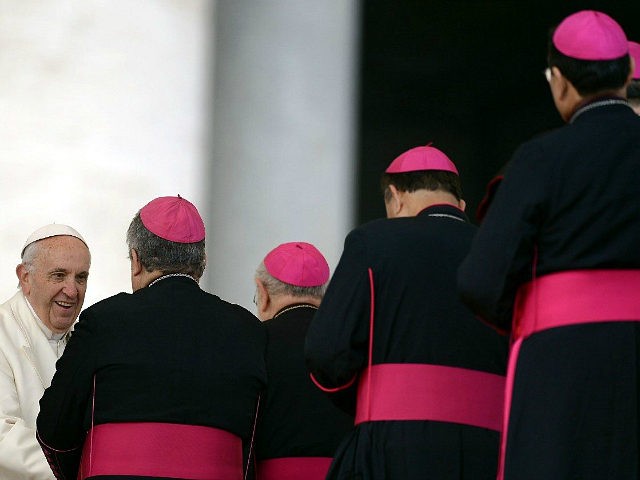The New York Times politicized the call from faithful American Catholics who urged their bishops to defend the profound teaching that Jesus is actually present in the Eucharist, and that self-professed Catholic public officials who support “grave moral evils,” such as abortion and euthanasia, not receive communion.
In an article Sunday, the Times claimed that while “liberals” Pope Francis and President Joe Biden are “the two most high-profile Roman Catholics in the world,” neither is charting the direction of the Church.
Pope Francis and President Biden, both liberals, are the two most high-profile Roman Catholics in the world. But in the U.S., a conservative movement determines how the church asserts its power. https://t.co/McDDle361v
— The New York Times (@nytimes) June 21, 2021
“It is now a conservative movement that decides how the Catholic Church asserts its power in America,” the authors stated, citing an overwhelming vote by the bishops Friday to approve the drafting of a document concerning the reception of Holy Communion.
As Breitbart News reported, the issue comes with “clear repercussions for President Joe Biden, a professed Catholic who supports the expansion of abortion rights.”
The report continued:
On May 1, the archbishop of San Francisco, Salvatore Cordileone, published a pastoral letter examining “the evil of abortion” and “the meaning of receiving Holy Communion.”
In that letter, Archbishop Cordileone wrote that Catholic politicians who advance pro-abortion legislation cooperate in the “grave moral evil” of killing an unborn child and should not receive Holy Communion.
“In the case of public figures who profess to be Catholic and promote abortion, we are not dealing with a sin committed in human weakness or a moral lapse: this is a matter of persistent, obdurate, and public rejection of Catholic teaching,” he wrote.
The Times described the bishops’ vote as a “conservative push to deny Mr. Biden communion over his support for abortion rights.”
Referring to faithful Catholics as a “contingent,” the authors said the faithful “had been gaining strength throughout the Trump era, clashing with the Vatican, wresting influence away from Pope Francis’ top representatives in the United States and further polarizing the Catholic faithful in the process.”
The Times also stated the bishops’ vote to defend its teachings will have the consequence of producing “an internal war over one of the church’s most sacred rituals.”
Brian Burch, president of CatholicVote, said in a statement accompanying results of the organization’s recent survey that found 74 percent of Catholics who attend Mass regularly say Catholic politicians who oppose the Church’s teachings should not receive Holy Communion:
Catholics’ concern about the flouting of Catholic social teaching by public leaders is less about politics and more about the integrity of the faith, along with reverence and respect due the Holy Eucharist. This polling data should bolster the confidence of Catholic bishops as they prepare to discuss how to recover an understanding of the beauty and richness of the sacrament – among all Catholics.
If the Eucharist is understood merely as a symbol or a participation badge, it makes sense to view the bishops’ concerns as political and punitive — why deny someone a meaningless door prize or party favor unless to punish him?
— CatholicVote.org (@CatholicVote) June 21, 2021
As Breitbart News reported, soon after becoming pope, Francis wrote to the Bishops of Argentina, his native country, instructing them to govern the Church there using a 2007 document from the Latin American bishops that called for “Eucharistic coherence”:
We should hold ourselves to “eucharistic coherence,” that is, we should be conscious that people cannot receive holy communion and at the same time act or speak against the commandments, in particular when abortion, euthanasia, and other serious crimes against life and family are facilitated.
“This responsibility applies particularly to legislators, governors, and health professionals,” the document elaborated.
“We hope that legislators, leaders and health professionals, aware of the dignity of human life and the roots of the family in our peoples, will defend and protect it from the abominable crimes of abortion and euthanasia,” the text said. “This is their responsibility.”
But if Catholics really believe what they claim—that this is the real, actual, literal body of Jesus Christ—then the bishops’ cause for concern, even if one doesn’t agree with them, at least takes on a different meaning beyond that of secular power politics.
— CatholicVote.org (@CatholicVote) June 21, 2021
In May, the Vatican prefect recommended a memorandum, written in 2004 by then-Cardinal Joseph Ratzinger, who subsequently became Pope Benedict XVI. The prefect noted that, in that document, Ratzinger provided “general principles on the worthy reception of Holy Communion,” which can be helpful “to assist local ordinaries in the United States in their dealings with Catholic pro-choice politicians.”
“Not all moral issues have the same moral weight as abortion and euthanasia,” Ratzinger wrote in his letter. “The Church teaches that abortion or euthanasia is a grave sin.”
Ratzinger continued, citing other Church documents:
Christians have a “grave obligation of conscience not to cooperate formally in practices which, even if permitted by civil legislation, are contrary to God’s law. Indeed, from the moral standpoint, it is never licit to cooperate formally in evil. […] This cooperation can never be justified either by invoking respect for the freedom of others or by appealing to the fact that civil law permits it or requires it.”
“Apart from an individual’s judgment about his worthiness to present himself to receive the Holy Eucharist, the minister of Holy Communion may find himself in the situation where he must refuse to distribute Holy Communion to someone,” Ratzinger continued.

COMMENTS
Please let us know if you're having issues with commenting.